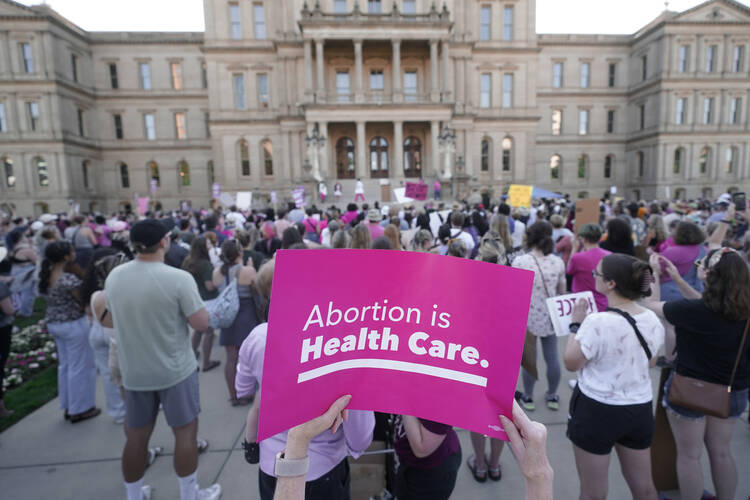Editor’s note: This article is part of The Conversation with America Media, offering diverse perspectives on important and contested issues in the life of the church. Read other views on abortion and the reversal of Roe v. Wade, as well as news coverage of the topic, here.
In the September issue of America, the esteemed Catholic author Peter Steinfels wrote that the U.S. bishops “must explicitly separate themselves and the church” from “extremism in the pro-life movement” and emphasize support for women as well as children. I think the bishops are in fact doing these things, and I want to raise the question of where extremism on this issue is more often found.
A commonly cited example of extremism is the idea of bringing charges against women who obtain or seek abortions. One state representative in Louisiana did propose that, after the May 2 leak of the draft Dobbs opinion. But on May 12, the leaders of 70 pro-life organizations landed on his proposal like a ton of bricks, strongly repudiating it. The third signer of this open letter to “all State Legislators in the United States of America” is the chairman of the U.S. bishops’ Committee on Pro-Life Activities. The proposal has been withdrawn, and state lawmakers across the country have been put on notice.
Candidates who had described themselves as pro-life were subjected to attack ads implying that they want to ban abortions even when the mother’s life is endangered (a feature of no existing law).
There has also been a backlash against some legislators and candidates who assumed that their constituents, after almost half a century of judicially imposed abortion on demand, would immediately be willing to support nearly complete bans on abortion. Candidates who had described themselves as pro-life were subjected to attack ads implying that they want to ban abortions even when the mother’s life is endangered (a feature of no existing law).
But when they removed such language from their websites and said they would consider more modest laws that have broad support (e.g., laws against later-term abortion), they were then attacked by major media outlets as “sneaky” flip-floppers. The pursuit of overly ambitious agendas is generally self-correcting in politics, especially in an election year (the legislation from abortion proponents that I discuss below is an exception). Currently, however, pro-life moderation does not seem to be stopping the attacks.
The U.S. bishops’ position, announced in their Pastoral Plan for Pro-Life Activities, has been to support passage of laws to “restrict the practice of abortion as much as possible.” The phrase “as much as possible” is important to the discussion of extremism, as Pope St. John Paul II recognized in writing that pro-life legislators can validly support incremental laws aimed at “limiting the harm” of pro-abortion policies (“Evangelium Vitae,” No. 73).
Pope St. John Paul II recognized in writing that pro-life legislators can validly support incremental laws aimed at “limiting the harm” of pro-abortion policies.
In addition, the bishops have always said that changing laws is not enough by itself. Since 1975 they have urged a three-pronged effort at education (directed to Catholics and the general public), public policy and pastoral care—with prayer given separate emphasis as a fourth prong in more recent editions of the Pastoral Plan. Their most ambitious pro-life project in recent years is “Walking with Moms in Need,” launched in 2020, but its full implementation was delayed by the pandemic. It challenges dioceses and parishes nationwide to expand their aid to pregnant women and their children, and to serve as accessible resources for connecting these women and their families with social services, health care and other needs. Some church programs provide support and accompaniment through the child’s fifth birthday.
We should also be aware of the abortion proposals collectively supported by the bishops (and by opponents of pro-life legislation) in Congress. Specifically, the bishops support the Pain-Capable Unborn Child Protection Act (called H.R. 1080 in its current form), restricting abortion at 20 weeks or more after fertilization (or the 22nd week of what physicians call gestational age). At this stage, the child not only can feel pain but is fully formed and may be able to survive outside the womb—and some studies suggest that abortion at this point is a greater threat to the mother’s life than childbirth. This legislation has exceptions for when a mother’s life is endangered, as well as for cases of rape or cases of incest involving a minor. Yet abortion advocacy groups oppose it as fiercely as though it were a complete ban on abortions, and it cannot get even a committee hearing in the current Congress.
On the pro-abortion side, extremism is very much in the driver’s seat—and mainstream media protect it through bias and misinformation.
What is moving forward instead? Something called the Women’s Health Protection Act (H.R. 8296), which had been endorsed by dozens of pro-abortion organizations (including Catholics for Choice). It has been approved twice by the House (supported this year by all but one Democrat in that chamber) and is supported by President Biden and by all but one Democrat (Joe Manchin of West Virginia) in the Senate. Far more sweeping than Roe v. Wade, it attacks hundreds of modest and widely supported state laws upheld under Roe on matters such as parental notification, health regulations for clinics, informed consent and requirements that abortions be performed by a licensed physician. Yet national news media routinely misrepresent it as simply “codifying Roe.”
Are there extremists on the fringe of the pro-life movement, as in all movements? Yes. But on the pro-abortion side, extremism is very much in the driver’s seat—and mainstream media protect it through bias and misinformation. My hope is that Catholic journalism will provide a corrective. Meanwhile, the U.S. bishops remain committed to principle—including the principle of respect and support for both patients involved in abortion—as well as to recognizing political realities in a pluralistic society. That deserves to be recognized and emulated.








